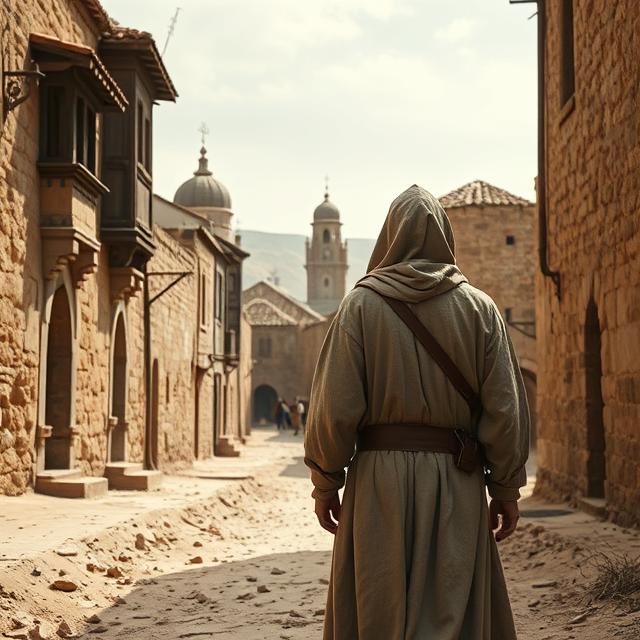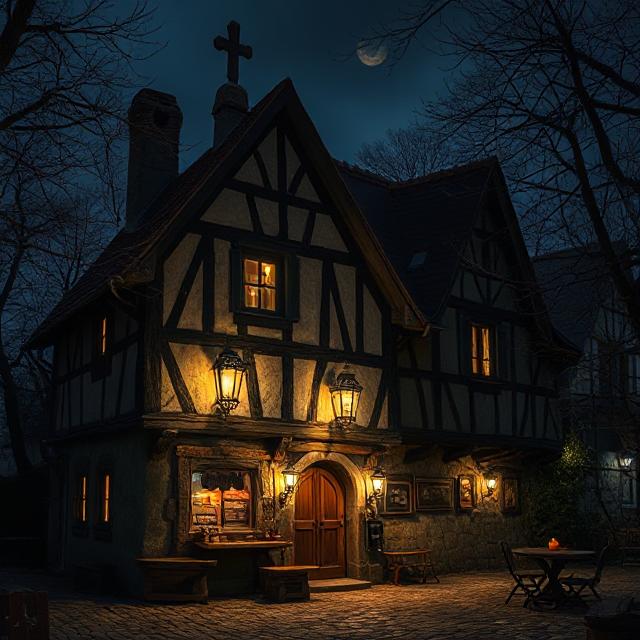The dawn bleeds thin light through the mists, washing the streets of Moravice in pale, colorless hues. You walk them quietly, your hood drawn low, the hem of your cloak damp with gutter water. The city moves sluggishly—merchants setting up stalls under the eyes of patrols, beggars stirring from doorways, children darting through alleys with faces too old for their years. You know every corner of these streets, yet they no longer know you.
Every face you pass might be a spy; every shadow could hold a knife. Once, your family’s crest had commanded loyalty—now it would summon executioners.

You keep to the narrow lanes and half-ruined markets, avoiding the squares where Drevanyn soldiers patrol in pairs. They wear your father’s colors inverted—red where it should be gold, black where it should be blue—a mockery of lineage turned inside out. You watch them from afar, bitterness biting deep.
By midday, hunger drives you into the warren of the river district. The markets here are smaller, quieter, filled with desperate eyes and low whispers. You buy stale bread and dried meat from an old woman who doesn’t meet your gaze. When you ask about old houses—friends, allies, merchants who once traded under your father’s banner—she only shakes her head. “Gone,” she mutters. “Or hiding. Best you do the same.”
You thank her and move on.
The day stretches into a haze of searching—through the charred skeletons of townhouses, the abandoned warehouses where your family’s goods once lay stored. The seal of Zalenice has been struck from every door, every ledger, every memory that dared recall it. When you finally reach the merchant quarter, you find the great fountain where your mother once commissioned mosaics now filled with rubble and ash.
You sit beside it, exhausted.
The world feels hollow—like a stage stripped of scenery, actors gone, only echoes left. You think of Margaret again. Her voice, her touch, her silence. The betrayal still burns, but beneath it is something worse: longing. For her, for the warmth of her words, for the illusion of safety you built together. You hate her for it—and still you crave it.
As evening falls, you make your way back toward the eastern quarter, where Janek’s directions still echo faintly in your mind. The air grows colder, the fog thicker. Somewhere behind you, boots strike the cobblestones—measured, deliberate. You turn down an alley, heart hammering. The footsteps quicken. You hurry towards a tavern, the only light you see along the long street.

A hand seizes your arm. You spin, dagger half-drawn—
—but the face you see stops you.
“Easy, my lord,” whispers a voice. “You’ll have the whole watch on us.”
The man’s features emerge from shadow—broad shoulders, graying beard, eyes sharp with recognition. You remember him now: Tomas, once the master of your stables. He releases you slowly, glancing around before speaking again. “Come. Not here.”
He leads you through a warren of backstreets to a modest house tucked behind a tannery. The shutters are drawn, the air heavy with the scent of woodsmoke. Inside, it is warm, dimly lit, and quiet.
“My wife’s gone to the provinces,” Tomas says softly. “Took the younger ones with her. Safer that way. Only my eldest remains—Joanna. She keeps the house.”
You nod, too weary to speak.
Joanna enters a moment later with a lantern, her hair bound simply, her face marked by both youth and care. There is something in her eyes—a gentleness that makes you ache. She looks at you with curiosity, not fear.
“So it’s true,” she says softly. “The heir lives.”
You almost correct her—not heir, not anymore—but the words die in your throat.
That night, Tomas gives you a small room above the stables. You sleep little. The sounds of the city filter through the walls—the creak of carts, the distant call of patrols, the whisper of rain against tile. When sleep comes, it is full of faces: your father’s, your mother’s, Margaret’s, all fading, all out of reach.
Days blur into each other. You move carefully, always at dusk or dawn. You try to reach out to old contacts, discreetly, through coded notes and familiar signs—but every attempt ends the same: silence. Either they are dead, or too afraid to answer.
In Tomas’s house, life carries on with quiet precision. He works during the day repairing harnesses, shoes, anything to keep suspicion away. Joanna tends the hearth, cooks, mends, listens. She never asks about your plans, only watches you with eyes that remind you too much of someone else.
One evening, as rain lashes against the shutters, you find her by the fire. She looks up as you enter, the light glinting off her hair.
“You should eat,” she says. “You’ve barely touched food in days.”
“I’m not hungry.”
“You need strength to survive, my lord. Even ghosts need strength.”
Her tone is neither mocking nor gentle—just true. You sit beside her, the warmth of the fire touching both your faces. For a long time neither of you speak. Then she says, quietly, “I remember your mother. She came once to the stables when I was small. She gave me a ribbon and told me I had kind eyes. I kept it for years.”
Something inside you loosens. You reach out before you think, your fingers brushing hers. She does not pull away.
When you kiss her, it is not passion—it is hunger. For warmth, for human closeness, for the illusion that the world has not ended. She kisses you back, slow, uncertain, and then certain, her hand rising to your cheek.
Later, as the fire dies, she lies beside you, asleep. You watch her, feeling both comfort and guilt twist together like roots. She reminds you of Margaret—the curve of her face, the quiet strength—but she is not Margaret. And that, perhaps, is what allows you to stay.
Weeks pass in uneasy peace. You help Tomas mend tack, carry wood, move goods by night for small coin. You keep your hood low, your name hidden. But rumors begin to drift through the city—of new purges, of spies hunting those who once served your house.
One morning, Tomas bursts through the door, breath ragged. “They’re searching the quarter,” he says. “They found a list—names of old retainers. Mine’s among them.”
You feel the cold rush of fate closing in. “Then we can’t stay.”
He nods grimly. “We leave by the river. I’ve a contact still loyal—a ferryman. He’ll take us south. But you must go tonight.”
Together, you move quickly. In the dark beneath the stables, Tomas pries up floorboards, revealing a small chest wrapped in oilcloth. When he opens it, the glint of gold and silver flashes faintly.
“I kept what I could,” he says. “A few heirlooms, coins, pieces I smuggled out when the estate burned. They belong to you.”
You kneel beside him, stunned. The sight of your family’s crest on the hilt of a dagger, a ring, a locket—small remnants of a world now gone—breaks something open in you.
“You saved these?” you whisper.
He nods. “For the day you returned. I didn’t think it would come.”
You close the chest slowly. “Then take half. For your loyalty. For Joanna.”
He protests, but you press the gold into his hands. “Without you, I would be dead. Without her, I would have forgotten what it means to live.”
When night falls, the three of you stand at the edge of the river. The fog rolls thick, swallowing the docks. The ferryman waits, lantern dimmed, boat rocking in the current.
You turn to Joanna. She watches you, eyes glistening, lips pressed tight.
“You could come,” you say. “There’s room enough. Where I go, it won’t be safe—but it will be free.”
Her breath catches. “And if I stay?”
“Then you live. Quietly. Safely. Perhaps you’ll forget me.”
She shakes her head. “I won’t.”
The moment stretches. The world seems to hold its breath. In that heartbeat, you see both futures—the one where she walks beside you into exile, her laughter soft against the crash of foreign shores, and the one where you leave her here, a ghost in a city of ash, her memory another wound you will carry across every horizon.
The crow stirs within you again, black wings beating against your ribs. Two paths. Always two.
Tomas lays a hand on your shoulder. “It’s time, my lord.”
You nod, turning toward the mist-shrouded river.
Whether you step onto the boat alone or reach back for Joanna’s hand—
that choice will define the rest of your life.
The ferryman waits. The current whispers.
And somewhere beyond the fog, your destiny—love or vengeance—awaits its heir.
….
…..

One Comment